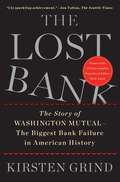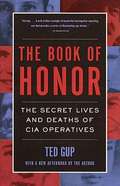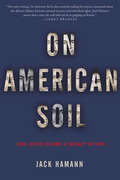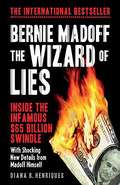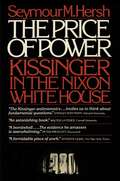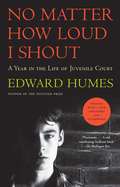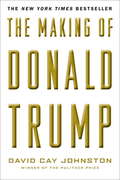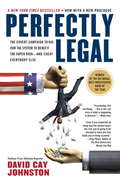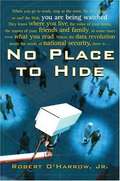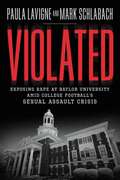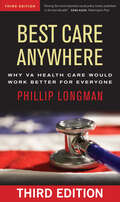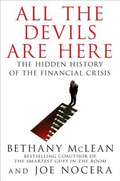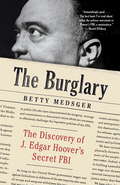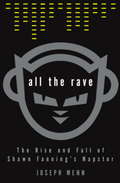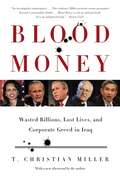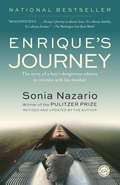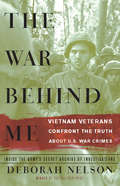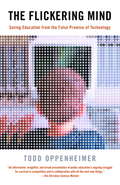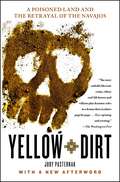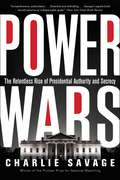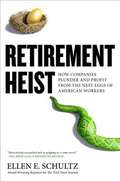Special Collections
Investigative Reporters and Editors Award
Description: The annual IRE Awards recognize outstanding investigative work and help identify the techniques and resources used to complete each story. This collection includes award winners and finalists. #award
- Table View
- List View
The Lost Bank
by Kirsten GrindDuring the most dizzying days of the financial crisis, Washington Mutual, a bank with hundreds of billions of dollars in its coffers, suffered a crippling bank run. The story of its final, brutal collapse in the autumn of 2008, and its controversial sale to JPMorgan Chase, is an astonishing account of how one bank lost itself to greed and mismanagement, and how the entire financial industry--and even the entire country-- lost its way as well. Kirsten Grind's The Lost Bank is a magisterial and gripping account of these events, tracing the cultural shifts, the cockamamie financial engineering, and the hubris and avarice that made this incredible story possible. The men and women who become the central players in this tragedy-- the regulators and the bankers, the home buyers and the lenders, the number crunchers and the shareholders--are heroes and villains, perpetrators and victims, often switching roles with one another as the drama unfolds. As a reporter at the time for the Puget Sound Business Journal, Grind covered a story set far from the epicenters of finance and media. It happened largely in places such as the suburban homes of central California and the office buildings of Seattle, but Grind covered the story from the beginning, and the clarity and persistence of her reporting earned her many awards, including being named a finalist for the Pulitzer Prize and the Gerald Loeb Award. She takes readers into boardrooms and bedrooms, revealing the power struggles that pitted regulators at the Office of Thrift Supervision and the FDIC against one another and the predatory negotiations of investment bankers and lawyers who enriched themselves during the bank's rise and then devoured the decimated bank in its final days. Written as compellingly as the finest fiction, The Lost Bank makes it clear that the collapse of Washington Mutual was not just the largest bank failure in American history. It is a story of talismanic qualities, reflecting the incredible rise and the precipitous collapse of not only an institution but of trust, fortunes, and the marketplaces for risk across the world.
The Book of Honor
by Ted GupThis is a story of heroes and secrets. In the entrance of the CIA headquarters looms a huge marble wall into which seventy-one stars are carved--each representing an agent who has died in the line of duty. At the base of this wall lies "The Book of Honor," in which the names of these agents are inscribed--or at least thirty-five of them. Beside the dates of the other thirty-six, there are no names. The identity of these "nameless stars" has been one of the CIA's most closely guarded secrets for the fifty-three years of the agency's existence. Even family members are told little--in some cases, the agency has denied the fact that the deceased were covert operatives at all. But what the CIA keeps secret in the name of national security is often merely an effort to hide that which would embarrass the agency itself--even at the cost of denying peace of mind for the families and honor due the "nameless stars. " In an extraordinary job of investigative reporting, Ted Gup has uncovered the identities, and the remarkable stories, of the men and women who died anonymously in the service of their country. In researchingThe Book of Honor, Gup interviewed over four hundred current and former covert CIA officers, immersed himself in archival records, death certificates, casualty lists from terrorist attacks, State Department and Defense Department personnel lists, cemetery records, obituaries, and tens of thousands of pages of personal letters and diaries. In telling the agents' stories, Gup shows them to be astonishingly complex, vibrant, and heroic individuals--nothing like the suave superspies of popular fiction or the amoral cynics of conspiracy buffs. The accounts of their lives--and deaths--are powerful and deeply moving, and in bringing them at long last to light, Gup manages to render an unprecedented history of covert operations at the CIA.
On American Soil
by Jack HamannOn a hot August night in 1944, a soldier’s body was discovered hanging by a rope from a cable spanning an obstacle course at Seattle’s Fort Lawton. The body was identified as Private Guglielmo Olivotto, one of the thousands of Italian prisoners of war captured and brought to America. The murder stunned the nation and the international community. Under pressure to respond quickly, the War Department convened a criminal trial at the fort, charging three African American soldiers with the lynching and firstdegree murder of Private Olivotto. Forty other soldiers were charged with rioting, accused of storming the Italian barracks on the night of the murder. All forty-three soldiers were black. There was no evidence implicating any of these men. Leon Jaworski, later the lead prosecuter at the Watergate trial, was appointed to prosecute the case and seek the death penalty for three men who were most assuredly innocent. Through his access to previously classified documents and the information gained from extensive interviews, journalist Jack Hamann tells the whole story behind World War II’s largest army court-martial—a story that raises important questions about how justice is carried out when a country is at war.
Bernie Madoff, the Wizard of Lies
by Diana B. HenriquesBased on award-winning reporter Diana Henriques' unprecedented access to Madoff, including extensive correspondence and his first interviews for publication since his arrest, "Bernie Madoff, The Wizard of Lies" is the ultimate true-life financial thriller.
The Price of Power
by Seymour M. HershFrom the introduction: "This book is an account of the foreign policy of the United States, presided over by Henry Kissinger, during Richard Nixon's first term in the White House. It is also an account of the relationship between two men who collaborated on what seemed to be a remarkable series of diplomatic triumphs. These were the years when China was reclaimed by American diplomacy; when a much-praised agreement on strategic arms limitation (SALT) was negotiated with the soviet Union; when a complex dispute in West Berlin was settled; and when American participation in the war in Vietnam, the most crucial issue facing the American presidency, was brought to a dramatic end with the signing of the Paris peace accords in January 1973, three days after Nixon was inaugurated for a second term."
No Matter How Loud I Shout
by Edward HumesNow updated with a new introduction and afterword, this award-winning examination of the nation's largest juvenile criminal justice system in Los Angeles by a Pulitzer Prize-winning journalist is "an important book with a message of great urgency, especially to all concerned with the future of America's children" (Booklist).In an age when violence and crime by young people is again on the rise, No Matter How Loud I Shout offers a rare look inside the juvenile court system that deals with these children and the impact decisions made in the courts had on the rest of their lives. Granted unprecedented access to the Los Angeles Juvenile Court, including the judges, the probation officers, and the children themselves, Edward Humes creates an unforgettable portrait of a chaotic system that is neither saving our children in danger nor protecting us from adolescent violence. Yet he shows us there is also hope in the handful of courageous individuals working tirelessly to triumph over seemingly insurmountable odds. Weaving together a poignant, compelling narrative with razor-sharp investigative reporting, No Matter How Loud I Shout is a convincingly reported, profoundly disturbing discussion of the Los Angeles juvenile court's failings, providing terrifying evidence of the system's inability to slow juvenile crime or to make even a reasonable stab at rehabilitating troubled young offenders. Humes draws an alarming portrait of a judicial system in disarray.
The Making of Donald Trump
by David Cay JohnstonThe culmination of nearly 30 years of reporting on Donald Trump, Pulitzer Prize-winning investigative reporter, David Cay Johnston, takes a revealingly close look at the mogul's rise to power and prominence.
Covering the long arc of Trump's career, Johnston tells the full story of how a boy from a quiet section of Queens, NY would become an entirely new, and complex, breed of public figure. Trump is a man of great media savvy, entrepreneurial spirit, and political clout. Yet his career has been plagued by legal troubles and mounting controversy.
From the origins of his family's real estate fortune, to his own too-big-to-fail business empire; from his education and early career, to his whirlwind presidential bid, The Making of Donald Trump provides the fullest picture yet of Trump's extraordinary ascendency. Love him or hate him, Trump's massive influence is undeniable, and figures as diverse as Woody Guthrie (who wrote a scathing song about Trump's father) and Red Scare prosecutor Roy Cohn, mob bosses and high rollers, as well as the average American voter, have all been pulled into his orbit.
Drawing on decades of interviews, financial records, court documents, and public statements, David Cay Johnston, who has covered Trump more closely than any other journalist working today, gives us the most in-depth look yet at the man who would be president.
A New York Times Bestseller
Perfectly Legal
by David Cay JohnstonOne of the country's top investigative reporters reveals how the richest 1 percent of the country has rigged the tax code and other laws in its favor. Since the mid-1970s, there has been a dramatic shift in America's socioeconomic system, one that has gone virtually unnoticed by the general public. Tax policies and their enforcement have become a disaster, and thanks to discreet lobbying by a segment of the top 1 percent, Washington is reluctant or unable to fix them. The corporate income tax, the estate tax, and the gift tax have been largely ignored by the media. But the cumulative results are remarkable: today someone who earns a yearly salary of $60,000 pays a larger percentage of his income in taxes than the four hundred richest Americans. Pulitzer Prize-winning investigative reporter David Cay Johnston exposes exactly how the middle class is being squeezed to create a widening wealth gap that threatens the stability of the country. By relating the compelling tales of real people across all areas of society, he reveals the truth behind: * "middle class" tax cuts and exactly whom they benefit * how workers are being cheated out of their retirement plans while disgraced CEOs walk away with millions * how some corporations avoid paying anyfederal income tax * how a law meant to prevent cheating by the top 2 percent of Americans no longer affects most of them, but has morphed into a stealth tax on single mothers making just $28,000 * why the working poor are seven times more likely to be audited by the IRS than everyone else * how the IRS became so weak that even when it was handed complete banking records detailing massive cheating by 1,600 people, it prosecuted only 4 percent of them Johnston has been breaking pieces of this story on the front page of The New York Timesfor seven years. With Perfectly Legal, he puts the whole shocking narrative together in a way that will stir up media attention and make readers angry about the state of our country.
No Place to Hide
by Robert O'Harrow Jr.An award-winning reporter for The Washington Post, O'Harrow reviews some of the surveillance and identification technologies and procedures now being used by corporations and governments against the American people. He begins with the flood of measures adopted during the six weeks after the September 2001 attacks. Other topics include the data revolution, Total Information Awareness, and the government's eyes and ears. Annotation ©2007 Book News, Inc., Portland, OR (booknews.com)
Violated
by Mark Schlabach and Paula LavigneIn VIOLATED, two ESPN investigative reporters provide readers with a shocking narrative of sexual crimes committed against women and a university's culture that kept them quiet.
Throughout its history, Baylor University has presented itself as something special: As the world's largest Baptist university, it was unabashedly Christian. It condemned any sex outside of marriage, and drinking alcohol was grounds for dismissal. Students weren't even allowed to dance on campus until 1996. During the last several years, however, Baylor officials were hiding a dark secret: Female students were being sexually assaulted at an alarming rate. Baylor administrators did very little to help victims, and their assailants rarely faced discipline for their abhorrent behavior.
Finally, after a pair of high-profile criminal cases involving football players, an independent examination of Baylor's handling of allegations of sexual assault led to sweeping changes, including the unprecedented ouster of its president, athletics director, and popular, highly successful football coach.
For several years, campuses and sports teams across the country have been plagued with accusations of sexual violence, and they've been criticized for how they responded to the students involved. But Baylor stands out. A culture reigned in which people believed that any type of sex, especially violent non-consensual sex, simply "doesn't happen here." Yet it was happening. Many people within Baylor's leadership knew about it. And they chose not to act. Paula Lavigne and Mark Schlabach weave together the complex - and at times contradictory - narrative of how a university and football program ascending in national prominence came crashing down amidst the stories of woman after woman coming forward describing their assaults, and a university system they found indifferent to their pain.
Best Care Anywhere
by Phillip LongmanPhil Longman, an award-winning journalist and senior fellow at the New America Foundation, tells the compelling story of how the Veterans Administration, once notorious for dangerous, dirty and scandal-ridden hospitals, transformed itself into what is demon¬strably the highest quality health care system in America. By making extensive use of electronic medi¬cal records and evidence-based medicine the VA has devel¬oped a model of 21st century health care that boosts safety, cost effectiveness, and patient satisfaction, and provides deep les¬sons for overhauling the U.S. health care system. Drawing on real world examples and the latest scientific research, Best Care Anywhere--now in it's second edition--is particularly with the passage of health care reform in America, offering readers powerful new ways of thinking about health care. "Among the most important social policy books published in the last decade." --Ezra Klein, The Washington Post
All the Devils Are Here
by Bethany Mclean and Joe Nocera"Hell is empty, and all the devils are here." -Shakespeare, The TempestAs soon as the financial crisis erupted, the finger-pointing began. Should the blame fall on Wall Street, Main Street, or Pennsylvania Avenue? On greedy traders, misguided regulators, sleazy subprime companies, cowardly legislators, or clueless home buyers?According to Bethany McLean and Joe Nocera, two of America's most acclaimed business journalists, the real answer is all of the above-and more. Many devils helped bring hell to the economy. And the full story, in all of its complexity and detail, is like the legend of the blind men and the elephant. Almost everyone has missed the big picture. Almost no one has put all the pieces together.All the Devils Are Here goes back several decades to weave the hidden history of the financial crisis in a way no previous book has done. It explores the motivations of everyone from famous CEOs, cabinet secretaries, and politicians to anonymous lenders, borrowers, analysts, and Wall Street traders. It delves into the powerful American mythology of homeownership. And it proves that the crisis ultimately wasn't about finance at all; it was about human nature.Among the devils you'll meet in vivid detail:* Angelo Mozilo, the CEO of Countrywide, who dreamed of spreading homeownership to the masses, only to succumb to the peer pressure-and the outsized profits-of the sleaziest subprime lending.* Roland Arnall, a respected philanthropist and diplomat, who made his fortune building Ameriquest, a subprime lending empire that relied on blatantly deceptive lending practices.* Hank Greenberg, who built AIG into a Rube Goldberg contraption with an undeserved triple-A rating, and who ran it so tightly that he was the only one who knew where all the bodies were buried.* Stan O'Neal of Merrill Lynch, aloof and suspicious, who suffered from "Goldman envy" and drove a proud old firm into the ground by promoting cronies and pushing out his smartest lieutenants.* Lloyd Blankfein, who helped turn Goldman Sachs from a culture that famously put clients first to one that made clients secondary to its own bottom line.* Franklin Raines of Fannie Mae, who (like his predecessors) bullied regulators into submission and let his firm drift away from its original, noble mission.* Brian Clarkson of Moody's, who aggressively pushed to increase his rating agency's market share and stock price, at the cost of its integrity.* Alan Greenspan, the legendary maestro of the Federal Reserve, who ignored the evidence of a growing housing bubble and turned a blind eye to the lending practices that ultimately brought down Wall Street-and inflicted enormous pain on the country.Just as McLean's The Smartest Guys in the Room was hailed as the best Enron book on a crowded shelf, so will All the Devils Are Here be remembered for finally making sense of the meltdown and its consequences.
The American Way of Eating
by Tracie McmillanWhat if you can't afford nine-dollar tomatoes? That was the question award-winning journalist Tracie McMillan couldn't escape as she watched the debate about America's meals unfold, one that urges us to pay food's true cost--which is to say, pay more. So in 2009 McMillan embarked on a groundbreaking undercover journey to see what it takes to eat well in America. For nearly a year, she worked, ate, and lived alongside the working poor to examine how Americans eat when price matters. From the fields of California, a Walmart produce aisle outside of Detroit, and the kitchen of a New York City Applebee's, McMillan takes us into the heart of America's meals. With startling intimacy she portrays the lives and food of Mexican garlic crews, Midwestern produce managers, and Caribbean line cooks, while also chronicling her own attempts to live and eat on meager wages. Along the way, she asked the questions still facing America a decade after the declaration of an obesity epidemic: Why do we eat the way we do? And how can we change it? To find out, McMillan goes beyond the food on her plate to examine the national prio-rities that put it there. With her absorbing blend of riveting narrative and formidable investigative reporting, McMillan takes us from dusty fields to clanging restaurant kitchens, linking her work to the quality of our meals--and always placing her observations in the context of America's approach not just to farms and kitchens but to wages and work. The surprising answers that McMillan found on her journey have profound implications for our food and agriculture, and also for how we see ourselves as a nation. Through stunning reportage, Tracie McMillan makes the simple case that--city or country, rich or poor--everyone wants good food. Fearlessly reported and beautifully written, The American Way of Eating goes beyond statistics and culture wars to deliver a book that is fiercely intelligent and compulsively readable. Talking about dinner will never be the same again.
The Burglary
by Betty MedsgerThe never-before-told full story of the 1971 history-changing break-in of the FBI offices in Media, Pennsylvania, by a group of unlikely activists--quiet, ordinary, hardworking Americans--that made clear the shocking truth and confirmed what some had long suspected, that J. Edgar Hoover had created and was operating his own shadow Bureau of Investigation.The book shows how the break-in, and subsequent release of the contents of the FBI's files to newspapers across the country, upended the public's perception of the up-till-then inviolate head of the Bureau, paving the way for the FBI's overhaul for the first time since its inception forty-seven years before, in 1924, and setting the stage for the sensational release three months later by Daniel Ellsberg of the top-secret seven-thousand-page Pentagon study of U.S. decision making regarding the Vietnam War that became known as the Pentagon Papers.
All the Rave
by Joseph MennAt age 17, Shawn Fanning designed a computer program that transformed the Internet into an unlimited library of free music. His company, Napster, became a household name. It did not take long for the music industry to declare war, one that has now engulfed the biggest entertainment & technology companies on the planet. Here is the definitive account of the Napster saga, revealing secret takeover & settlement talks, the role of Shawn¿s uncle in controlling Napster, & hidden agendas & infighting from Napster¿s trenches to the top ranks of the media giant Bertelsmann. ¿A riveting account of genius & greed, visionary leaps & disastrous business decisions, & the clash of the hacker & investor cultures with that of the copyright establishment. ¿ Illus.
Blood Money
by T. Christian MillerIt was supposed to be quick and easy. The Bush Administration even promised that it wouldn't cost American taxpayers a thing--Iraqi oil revenues would pay for it all. But billions and billions of dollars, and thousands of lives, later, the Iraqi reconstruction is an undeniable failure. Iraq pumps out less oil now than it did under Saddam. At best, Iraqis average all of twelve hours a day of electricity. American soldiers lack body armor and adequate protection for their motor vehicles. Increasingly worse off, Iraqis turn against us. Increasingly worse off, our troops are killed by a strengthening insurgency. As T. Christian Miller reveals in this searing and timely book, the Bush Administration has fatally undermined the war effort and our soldiers by handing out mountains of cash not to the best companies for the reconstruction effort, but to buddies, cronies, relatives and political hacks--some of whom have simply taken the money and run with it. Blistering, brilliant and shocking, this will be the breakout title when it comes to Iraq books, and the catalyst for national debate.
Enrique's Journey
by Sonia NazarioIn this astonishing true story, award-winning journalist Sonia Nazario recounts the unforgettable odyssey of a Honduran boy who braves unimaginable hardship and peril to reach his mother in the United States.
When Enrique is five years old, his mother, Lourdes, too poor to feed her children, leaves Honduras to work in the United States.
The move allows her to send money back home to Enrique so he can eat better and go to school past the third grade. Lourdes promises Enrique she will return quickly. But she struggles in America. Years pass. He begs for his mother to come back. Without her, he becomes lonely and troubled. When she calls, Lourdes tells him to be patient. Enrique despairs of ever seeing her again.
After eleven years apart, he decides he will go find her. Enrique sets off alone from Tegucigalpa, with little more than a slip of paper bearing his mother's North Carolina telephone number. Without money, he will make the dangerous and illegal trek up the length of Mexico the only way he can-clinging to the sides and tops of freight trains. With gritty determination and a deep longing to be by his mother's side, Enrique travels through hostile, unknown worlds.
Each step of the way through Mexico, he and other migrants, many of them children, are hunted like animals. Gangsters control the tops of the trains. Bandits rob and kill migrants up and down the tracks. Corrupt cops all along the route are out to fleece and deport them. To evade Mexican police and immigration authorities, they must jump onto and off the moving boxcars they call El Tren de la Muerte--The Train of Death.
Enrique pushes forward using his wit, courage, and hope-and the kindness of strangers. It is an epic journey, one thousands of immigrant children make each year to find their mothers in the United States.
Based on the Los Angeles Times newspaper series that won two Pulitzer Prizes, one for feature writing and another for feature photography, Enrique's Journey is the timeless story of families torn apart, the yearning to be together again, and a boy who will risk his life to find the mother he loves.
The War Behind Me
by Deborah NelsonA seasoned journalist uncovers a secret archive of hundreds of war crime investigations, tracks down the people involved, and emerges with a disturbing and revelatory story of what really happened in Vietnam.
The Flickering Mind
by Todd OppenheimerThe Flickering Mind, by National Magazine Award winner Todd Oppenheimer, is a landmark account of the failure of technology to improve our schools and a call for renewed emphasis on what really works. American education faces an unusual moment of crisis. For decades, our schools have been beaten down by a series of curriculum fads, empty crusades for reform, and stingy funding. Now education and political leaders have offered their biggest and most expensive promise ever—the miracle of computers and the Internet—at a cost of approximately $70 billion just during the decade of the 1990s. Computer technology has become so prevalent that it is transforming nearly every corner of the academic world, from our efforts to close the gap between rich and poor, to our hopes for school reform, to our basic methods of developing the human imagination. Technology is also recasting the relationships that schools strike with the business community, changing public beliefs about the demands of tomorrow’s working world, and reframing the nation’s systems for researching, testing, and evaluating achievement. All this change has led to a culture of the flickering mind, and a generation teetering between two possible futures. In one, youngsters have a chance to become confident masters of the tools of their day, to better address the problems of tomorrow. Alternatively, they can become victims of commercial novelties and narrow measures of ability, underscored by misplaced faith in standardized testing. At this point, America’s students can’t even make a fair choice. They are an increasingly distracted lot. Their ability to reason, to listen, to feel empathy, is quite literally flickering. Computers and their attendant technologies did not cause all these problems, but they are quietly accelerating them. In this authoritative and impassioned account of the state of education in America, Todd Oppenheimer shows why it does not have to be this way. Oppenheimer visited dozens of schools nationwide—public and private, urban and rural—to present the compelling tales that frame this book. He consulted with experts, read volumes of studies, and came to strong and persuasive conclusions: that the essentials of learning have been gradually forgotten and that they matter much more than the novelties of technology. He argues that every time we computerize a science class or shut down a music program to pay for new hardware, we lose sight of what our priority should be: “enlightened basics. ” Broad in scope and investigative in treatment, The Flickering Mind will not only contribute to a vital public conversation about what our schools can and should be—it will define the debate. From the Hardcover edition.
Yellow Dirt
by Judy PasternakWINNER OF THE J. ANTHONY LUKAS WORK-IN-PROGRESS AWARD Atop a craggy mesa in the northern reaches of the Navajo reservation lies what was once a world-class uranium mine called Monument No. 2. Discovered in the 1940s--during the government's desperate press to build nuclear weapons--the mesa's tremendous lode would forever change the lives of the hundreds of Native Americans who labored there and of their families, including many who dwelled in the valley below for generations afterward. Yellow Dirt offers readers a window into a dark chapter of modern history that still reverberates today. From the 1940s into the early twenty-first century, the United States knowingly used and discarded an entire tribe for the sake of atomic bombs. Secretly, during the days of the Manhattan Project and then in a frenzy during the Cold War, the government bought up all the uranium that could be mined from the hundreds of rich deposits entombed under the sagebrush plains and sandstone cliffs. Despite warnings from physicians and scientists that long-term exposure could be harmful, even fatal, thousands of miners would work there unprotected. A second set of warnings emerged about the environmental impact. Yet even now, long after the uranium boom ended, and long after national security could be cited as a consideration, many residents are still surrounded by contaminated air, water, and soil. The radioactive "yellow dirt" has ended up in their drinking supplies, in their walls and floors, in their playgrounds, in their bread ovens, in their churches, and even in their garbage dumps. And they are still dying. Transporting readers into a little-known country-within-a-country, award-winning journalist Judy Pasternak gives rare voice to Navajo perceptions of the world, their own complicated involvement with uranium mining, and their political coming-of-age. Along the way, their fates intertwine with decisions made in Washington, D.C., in the Navajo capital of Window Rock, and in the Western border towns where swashbuckling mining men trained their sights on the fortunes they could wrest from tribal land, successfully pressuring the government into letting them do it their way. Yellow Dirt powerfully chronicles both a scandal of neglect and the Navajos' long fight for justice. Few had heard of this shameful legacy until Pasternak revealed it in a prize-winning Los Angeles Times series that galvanized a powerful congressman and a famous prosecutor to press for redress and repair of the grievous damage. In this expanded account, she provides gripping new details, weaving the personal and the political into a tale of betrayal, of willful negligence, and, ultimately, of reckoning.
Gone in the Night
by Rob Warden and David PortessA true story of prosecutorial and judicial misconduct
A Promise of Justice
by David Portess and Rob WardenAnother instance of shameful injustice in the American Justice system.
Power Wars
by Charlie SavagePulitzer Prize-winning journalist Charlie Savage's penetrating investigation of the Obama presidency and the national security stateBarack Obama campaigned on a promise of change from George W. Bush's "global war on terror." Yet from indefinite detention and drone strikes to surveillance and military tribunals, Obama ended up continuing-and in some cases expanding-many policies he inherited. What happened? In Power Wars, Charlie Savage looks inside the Obama administration's national security legal and policy team in a way that no one has before. Based on exclusive interviews with more than 150 current and former officials and access to previously unreported documents, he lays bare their internal deliberations, including emotional debates over the fates of detainees held on torture-tainted evidence and acts of war that lacked congressional authorization. He tells the inside stories of how Obama came to order the killing of an American citizen, preside over an unprecedented crackdown on leaks, and keep a then-secret National Security Agency program that collected records of every American's phone calls.Savage also pieces together the first comprehensive history of how American surveillance secretly developed over the past thirty-five years, synthesizing recent revelations and filling in gaps with new reporting. And he provides lucid explanations of legal dilemmas in a way that non-lawyers can understand. Highlighted by new information about the pivotal aftermath to the failed Christmas underwear bombing and the planning for the Osama bin Laden raid, Savage's own eyewitness reporting at Guantánamo, and detailed accounts of closed-door meetings at the highest levels of government, Power Wars equips readers to understand the legacy of Obama's presidency.
Exposed
by Mark SchapiroThe United States was once the pioneer of new approaches to environmental protection. In the 1970s and 1980s an American mix of scientific rigor and legal muscle gave birth to a body of environmental regulations and laws that was seen as a model around the world. But no more; leadership has switched. The European Union is asserting new priorities that are far more protective of citizens' health and the environment than those in the United States and they have the economic muscle to back them up.
Retirement Heist
by Ellen E. SchultzIt's no secret that hundreds of companies have been slashing pensions and health coverage earned by millions of retirees. Employers blame an aging workforce, stock market losses, and spiraling costs-a perfect storm of external forces that has forced them to take drastic measures. But this so-called retirement crisis is no accident. Award-winning investigative reporter Ellen E. Schultz reveals how large companies and the retirement industry-benefits consultants, insurance companies, and banks-have all played a huge, hidden role in the death spiral of American pensions and benefits. A little over a decade ago, most companies had more than enough set aside to pay the benefits earned by two generations of workers, no matter how long they lived. But by exploiting loopholes, ambiguous regulations, and new accounting rules, companies essentially turned their pension plans into piggy banks, tax shelters, and profit centers. Drawing on original analysis of company data, government filings, confidential memos, and more, Schultz uncovers decades of deception during which employers have exaggerated their retiree burdens while lobbying for government handouts, secretly cutting pensions, tricking employees, and misleading shareholders. She reveals how companies siphon billions of dollars from their pension plans to finance downsizings and sell the assets in merger deals; overstate the burden of rank-and-file retiree obligations to justify benefits cuts while using the savings to inflate executive pay and pensions; hide their growing executive pension liabilities, which at some companies now exceed the liabilities for the regular pension plans; purchase billions of dollars of life insurance on workers and use the policies as informal executive pension funds; preemptively sue retirees after cutting retiree health benefits and use other legal strategies to erode their legal protections. This is a scathing exposé of one of the most critical and least understood crises of our time.
